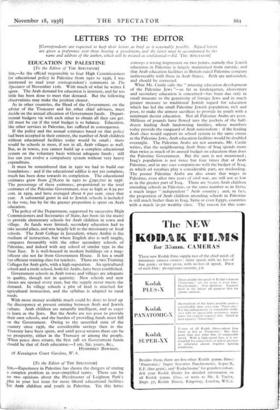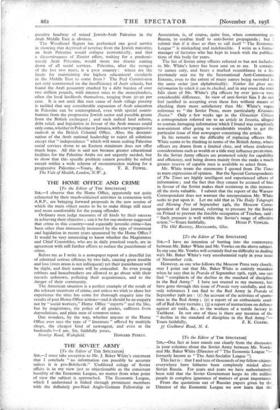[To the Editor of THE SPECTATOR]
Sta,—Experience in Palestine has shown the dangers of stating a complex problem in over-simplified terms. There can be no two opinions about the Headmaster of Leighton Park's plea in your last issue for more liberal educational facilities for Arab children and youth in Palestine. Yet this letter conveys a wrong impression on two points, namely that Jewish education in Palestine is largely maintained from outside, and that Arab education facilities in British-ruled Palestine compare unfavourably with those in Arab States. Both are unfounded, and should be corrected.
What Mr. Castle calls the " amazing education development of the Palestine Jews "—as far as kindergarten, elementary and secondary education is concerned—has been due only in small measure to the generosity of foreign Jews and in much greater measure to traditional Jewish regard for education which has led the small Palestine Jewish population, rich and poor, to make the utmost sacrifices to provide its youth with a minimum decent education. Not all Palestine Arabs are poor. Millions of pounds have flowed into the pockets of the half- dozen leading Arab landowning families, whose members today provide the vanguard of Arab nationalism : if the leading Arab class would support its school system to the same extent as the Palestine Jews, Arab education facilities would be doubled overnight. The Palestine Arabs are not unaware, Mr. Castle writes, that the neighbouring Arab State of Iraq spends more than twice as much of its annual budget on education than does the Palestine Government. But the sum is not mentioned ; Iraq's population is not twice but four times that of Arab Palestine, and in any case comparisons with the budget of Iraq, in which oil royalties play a considerable part, are misleading. The poorer Palestine Arabs are also aware that wages in Palestine, even after two years of civil war, are still not as low as in the greater part of Iraq. There arc 70,000 Arab children attending schools in Palestine, or the same number as in Syria, a much larger " independent " Arab country ; and, in fact, the proportion of Arab children attending schools in Palestine is still much higher than in Iraq, Syria or even Egypt, countries with a much larger wealthy class. The reason for this corn- parative headway of mixed Jewish-Arab Palestine in the Arab Middle East is obvious.
The Woodhead Report has performed one good service in showing that deprived of revenue from the Jewish minority, an Arab Palestine would collapse economically, and that a discontinuance of Zionist effort, making for a predomi- nantly Arab Palestine, would mean the drastic cutting down of all social services. Palestine, after the ravages of the last two years, is a poor country : where are the funds for maintaining the highest educational standards in the Middle East to come from ? The Peel Commission not only commented on the insufficiency of Arab schools, but found the Arab peasantry crushed by a debt burden of over two million pounds, with interest rates to the moneylenders, often the local landlords themselves, ranging from 3o-5o per cent. It is not until this root cause of Arab village poverty is tackled that any considerable expansion of Arab education in Palestine can be contemplated, even with special contri- butions from the progressive Jewish sector and possible grants from the British exchequer ; and such radical land reform, debt relief, and legislation in favour of the Arab masses could only come, whether in Palestine or Jamaica, with a new progressive outlook at the British Colonial Office. Also, the determi- nation of the Arab national leadership to reject all solutions except that " independence " which will mean scaling Palestine social services down to an Eastern minimum does not offer much hope. All this is said not because greater educational facilities for the Palestine Arabs are not urgently needed, but to show that this specific problem cannot possibly be solved except within a wide scheme of reconstruction making for a
progressive Palestine.—Yours, &c., T. R. FEIWEL. The Vale of Health, London,-N.W. 3.

























































 Previous page
Previous page